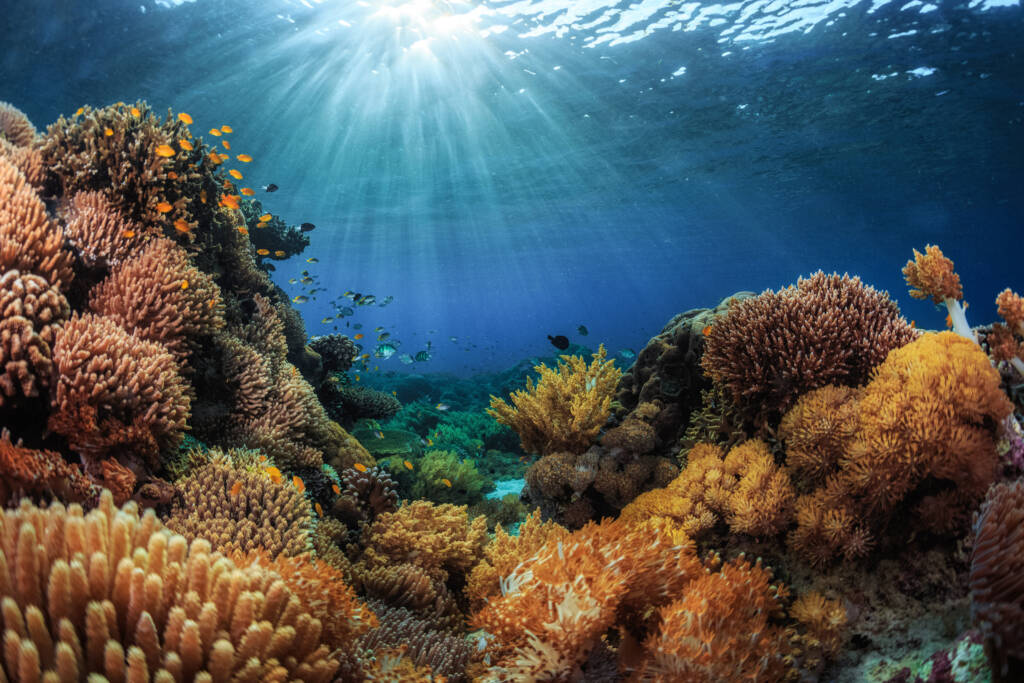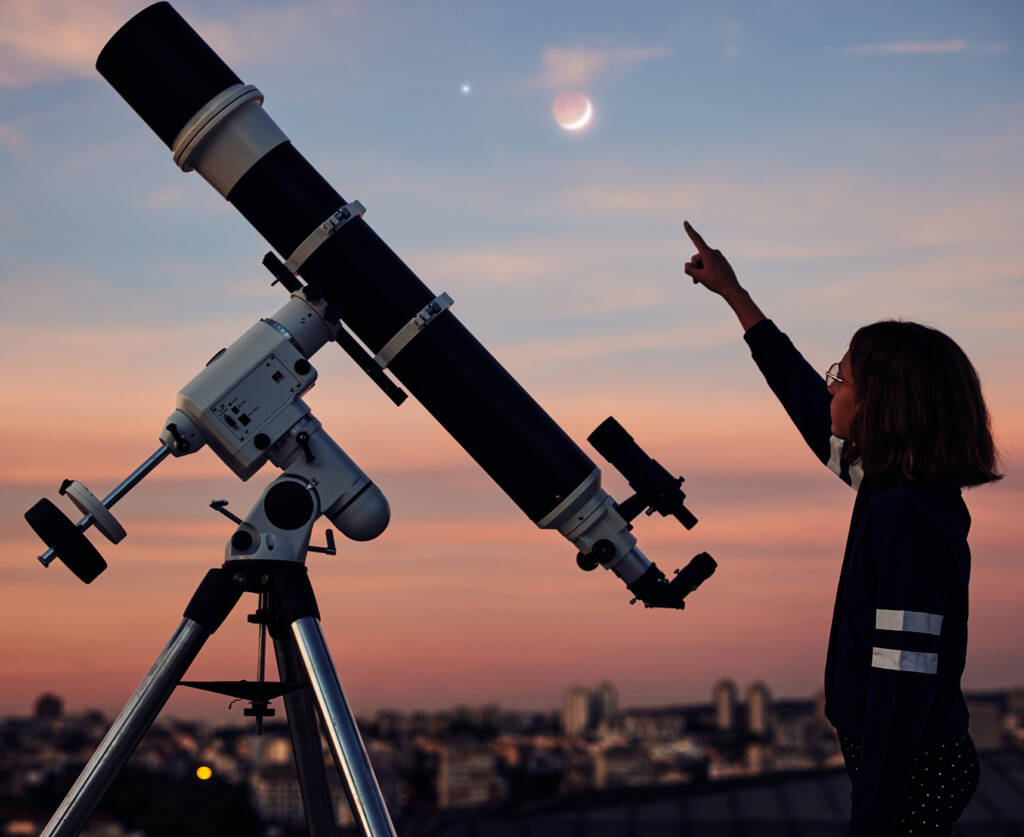
Earth Space Science (lab)/Earth Space Science Honors (lab)

Explore the universe in Earth Space Science, a laboratory course focusing on the study of space, geologic structures and forces, the waters on our planet, and atmospheric conditions. Through experimentation and investigation, students learn about Earth’s systems including the geosphere, hydrosphere, cryosphere, atmosphere, and the carbon cycle. This course offers interactive experiences, higher-order thinking, and real-world application along with a variety of assessments. Upon completion of the course, students will have a clear understanding of the dynamic forces at work in the world around them and how to become better caretakers of planet Earth.
Major Topics and Concepts
Module 01: Beginning with Science
Scientific Investigation
Theories and Laws
Measurement
Atomic Structure and Forces
Matter and Energy
Module 02: Climate and Meteorology
Water Cycle
The Atmosphere
Weather vs. Climate
Meteorology
Severe Weather
Global Climate Change
Module 03: Fresh Water
Surface Water
Groundwater
Water Quality
Water Conservation
Module 04: Our Universe
Light and the Universe
Exploring the Universe
Life Cycle of a Star
Stars and Elements
Origin and Expansion of the Universe
Origin of the Moon
Module 05: Rocks and Minerals
Minerals, Rocks, and the Rock Cycle
Rocks and Minerals as Resources
Soil and Soil Formation
Module 06: Geologic Time
Geologic Time Scale
Relative and Absolute Time
Origin and Evolution of Life
Coevolution of Earth Systems
Engineering Design I
Module 07: Oceans
Characteristics of the Ocean
Ocean Circulation
Waves
Tides and Water Power
Ocean Interactions
Engineering Design II
Module 08: Our Solar System
Formation of Our Solar System
Forces in Our Solar System
Physical Properties of Our Sun
Objects in Our Solar System
The Earth in Space
The Earth-Sun-Moon System
Engineering Design III
Module 09: The Geosphere
Structure of the Earth
The Carbon Cycle
Mechanisms of Movement
Structural Geology
Geologic Events
Engineering Design IV
Competencies
Matter and Energy
Students will demonstrate an understanding of matter and energy by describing the atomic structure and forces, explaining the phases and transformations of matter, and relating the processes of energy transference to the phases of matter.
Climate and Weather
Students will demonstrate an understanding of climate and weather by explaining the water cycle, describing Earth’s atmosphere, and comparing weather and climate.
Fresh Water
Students will demonstrate an understanding of fresh water by describing freshwater systems, explaining water quality, and describing water conservation.
Our Universe
Students will demonstrate an understanding of our universe by describing features of the universe, summarizing the exploration and origins of our universe, and explaining stars and elements.
Rocks and Minerals
Students will demonstrate an understanding of rocks and minerals by explaining mineral identification, describing the rock formation and the implications of mining, and evaluating soil characteristics and classification.
Geologic Time
Students will demonstrate an understanding of geologic time by explaining the geologic time scale, differentiating theories on the origin and evolution of life, and describing the coevolution of Earth’s systems.
The Oceans
Students will demonstrate an understanding of the oceans by describing the characteristics of the oceans, comparing ocean movements, and explaining ocean interactions.
Our Solar System
Students will demonstrate an understanding of our solar system by describing solar system formation, explaining the forces in our solar system, describing celestial objects, and explaining the Earth-sun-moon system.
The Geosphere
Students will demonstrate an understanding of the geosphere by describing the composition and structure of the geosphere, explaining the carbon cycle, and differentiating plate movement and boundaries.
Projects allow students to demonstrate competence and understanding of concepts and skills by completing a career-related task. For example, the assignment might be to create a mural, a package design, a speech, a film review, or a movie set – you name it! These creative projects are about applying your learning acquired through in-depth research to real-world career tasks.
Each competency will be addressed through a project that is based on a real-life career task. Here are the careers you will explore in Earth-Space Science Projects: Environmental Technician, Park Ranger, Non-Profit Social Media Manager, Podcast Producer, Environmental Law Attorney, Museum Curator, Marine Navigator, Planetarium Scriptwriter, and Civil Engineer.
Please also review the competency statements to learn more about the major topics and concepts covered in this offering.
Projects
Competencies
Matter and Energy
Students will demonstrate an understanding of matter and energy by describing the atomic structure and forces, explaining the phases and transformations of matter, and relating the processes of energy transference to the phases of matter.
Climate and Weather
Students will demonstrate an understanding of climate and weather by explaining the water cycle, describing Earth’s atmosphere, and comparing weather and climate.
Fresh Water
Students will demonstrate an understanding of fresh water by describing freshwater systems, explaining water quality, and describing water conservation.
Our Universe
Students will demonstrate an understanding of our universe by describing features of the universe, summarizing the exploration and origins of our universe, and explaining stars and elements.
Rocks and Minerals
Students will demonstrate an understanding of rocks and minerals by explaining mineral identification, describing the rock formation and the implications of mining, and evaluating soil characteristics and classification.
Geologic Time
Students will demonstrate an understanding of geologic time by explaining the geologic time scale, differentiating theories on the origin and evolution of life, and describing the coevolution of Earth’s systems.
The Oceans
Students will demonstrate an understanding of the oceans by describing the characteristics of the oceans, comparing ocean movements, and explaining ocean interactions.
Our Solar System
Students will demonstrate an understanding of our solar system by describing solar system formation, explaining the forces in our solar system, describing celestial objects, and explaining the Earth-sun-moon system.
The Geosphere
Students will demonstrate an understanding of the geosphere by describing the composition and structure of the geosphere, explaining the carbon cycle, and differentiating plate movement and boundaries.
Experiences allow you to explore a career field you’re curious about while mastering competencies for school credit. Through career-focused experiential learning, you will develop and learn skills for application to tasks typically completed as part of a career rather than using traditional assessments like essays or tests. During your Experience, you’ll work with a professional in the field to support your learning whom we call an “outside expert.” You’ll earn a badge for your accomplishments to share on social media and higher education platforms, or with colleges, potential employers, peers, and colleagues to display your qualifications.
Here’s how Experiences work:
- Each competency you work on is addressed through a separate deliverable (final product) predetermined by you and your instructor.
- Guided learning for each module consists of research and/or work with a professional in the field. Your instructor will coach you through this process.
- Each module culminates in a final demonstration of understanding, which includes a deliverable and a discussion-based assessment with your instructor.
Here’s an example:
Let’s say you’re curious about a career in healthcare. You decide you’d like to learn about this career area, make a professional connection, earn a badge, and meet competencies for your 9th-grade English requirement. While enrolled in English 1 Experiences, you conduct research to better understand language and structure in writing. Then you may work with an Occupational Therapist to help apply your writing skills to create an informational video about adaptive equipment for patients. The video aims to advise family members of patients regarding the use of accommodations and equipment to help patients perform daily tasks. Now you’ve earned the Language and Structure in Writing competency! This is just one example of the many ways Experiences can bridge competencies to careers.
Obtaining an Outside Expert: Prior to enrollment, please have an idea for an outside expert in mind or consult with our counseling department by emailing [email protected] for help in identifying one.
*A parent/guardian permission form and background check of the outside expert are both required to work with outside experts without parental supervision.
Competencies
Matter and Energy
Students will demonstrate an understanding of matter and energy by describing the atomic structure and forces, explaining the phases and transformations of matter, and relating the processes of energy transference to the phases of matter.
Climate and Weather
Students will demonstrate an understanding of climate and weather by explaining the water cycle, describing Earth’s atmosphere, and comparing weather and climate.
Fresh Water
Students will demonstrate an understanding of fresh water by describing freshwater systems, explaining water quality, and describing water conservation.
Our Universe
Students will demonstrate an understanding of our universe by describing features of the universe, summarizing the exploration and origins of our universe, and explaining stars and elements.
Rocks and Minerals
Students will demonstrate an understanding of rocks and minerals by explaining mineral identification, describing the rock formation and the implications of mining, and evaluating soil characteristics and classification.
Geologic Time
Students will demonstrate an understanding of geologic time by explaining the geologic time scale, differentiating theories on the origin and evolution of life, and describing the coevolution of Earth’s systems.
The Oceans
Students will demonstrate an understanding of the oceans by describing the characteristics of the oceans, comparing ocean movements, and explaining ocean interactions.
Our Solar System
Students will demonstrate an understanding of our solar system by describing solar system formation, explaining the forces in our solar system, describing celestial objects, and explaining the Earth-sun-moon system.
The Geosphere
Students will demonstrate an understanding of the geosphere by describing the composition and structure of the geosphere, explaining the carbon cycle, and differentiating plate movement and boundaries.

